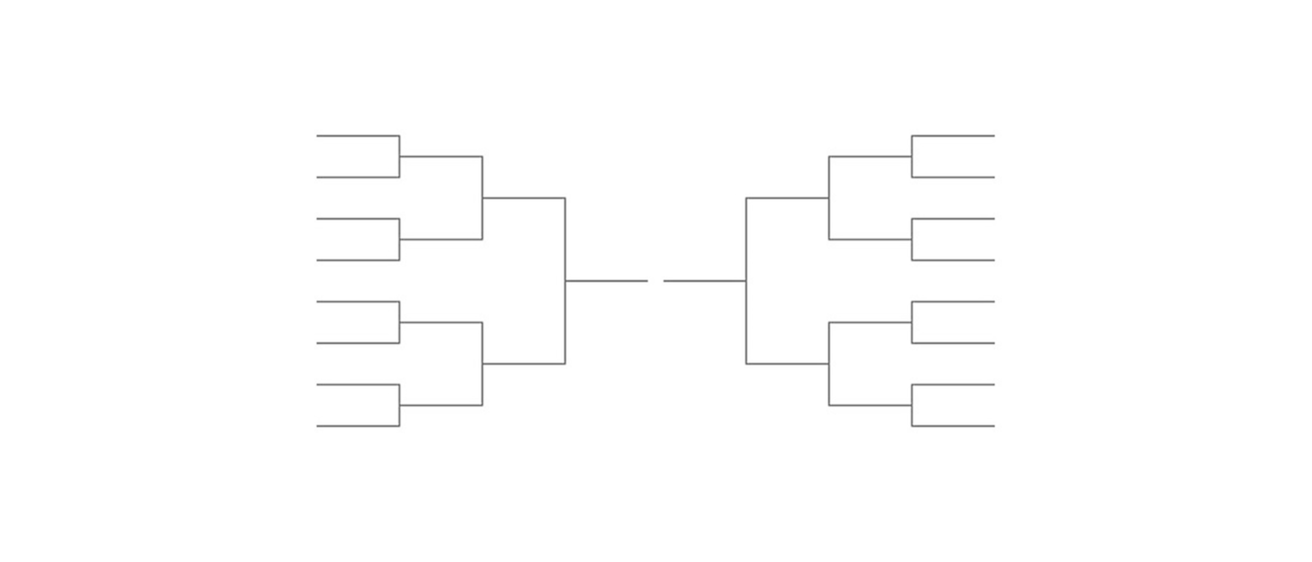
In the spirit of tournament season, we've set up a bracket to determine the greatest pre-exilic king of Israel and Judah.
Forty-three kings and one queen enter, and only one will remain standing as the greatest pre-exilic monarch. So let's meet the contestants in this BCE battle royale.
First, let's meet the four kings who ruled during the "United Kingdom" period, including one who's often forgotten. Their names, Hebrew names, and the pronunciations of the Hebrew names are listed below.
| "United Kingdom" Period |
|---|
| Saul (שָׁאוּל) (Shāʾūl) |
| Ishbaal / Ishbosheth (אִישׁ בֹּשֶׁת / אִישׁ בַּעַל) (ʾĪshbaʿal / ʾĪshbōsheṯ) (All tribes except Judah; 2 yrs; cf. 2 Samuel 2:8–10) |
| David (דָּוִד) (Dāvīḏ) (Judah only, 2 Samuel 2:4; then all Israel, 2 Samuel 5:1–4) |
| Solomon (שְׁלֹמֹה) (Shəlōmōh) |
Following the division of the kingdom, there were 20 kings in the Northern Kingdom of Israel, and 20 rulers (19 kings, 1 queen) in the Southern Kingdom of Judah. Some ruled only for a few days, and some were rival claimants to the throne ruling different tribes of the same kingdom simultaneously (like Tibni and Omri). So let's meet the monarchs of Israel and Judah.
(The monarchs on the same rows below did not necessarily rule at the same time.)
| Israel | Judah |
|---|---|
| Jeroboam I (יָרָבְעָם) (Yārŏvʿām) | Rehoboam (רְחַבְעָם) (Rəḥavʿām) |
| Nadab (נָדָב) (Nāḏāv) | Abiyam / Abijah (אֲבִיָּם / אֲבִיָּה) (ʾĂvīyām / ʾĂvīyāh) |
| Baasha (בַּעְשָׁא) (Baʿashāʾ) | Asa (אָסָא) (ʾĀsāʾ) |
| Elah (אֵלָה) (ʾĒlāh) | Jehoshaphat (יְהוֹשָׁפָט) (Yehōshāfāṭ) |
| Zimri (זִמְרִי) (Zimrī) (7 days) | Jehoram / Joram (יוֹרָם / יְהוֹרָם) (Yəhōrām / Yōrām) |
| Tibni (תִּבְנִי) (Tivnī) (half of Israel for 4–5 years; cf. 1 Kings 16:21–22) | Ahaziah (אֲחַזְיָה) (ʾĂḥazyāh) |
| Omri (עָמְרִי) (ʿOmrī) (half of the northern tribes, then all of Israel) | Athaliah (עֲתַלְיָה) (ʿĂṯalyāh) (Queen) |
| Ahab (אַחְאָב) (ʾAḥʾāv) | Joash / Jehoash (יְהוֹאָשׁ / יוֹאָשׁ) (Yōʾāsh / Yəhōʾāsh) |
| Ahaziah (אֲחַזְיָה) (ʾĂḥazyāh) | Amaziah (אֲמַצְיָהוּ) (ʾĂmaẓyāhū) |
| Jehoram / Joram (יוֹרָם / יְהוֹרָם) (Yəhōrām / Yōrām) | Uzziah (עֻזִּיָּהוּ) (ʿUzzīyāhū) |
| Jehu (יֵהוּא) (Yēhūʾ) | Jotham (יוֹתָם) (Yōṯām) |
| Jehoahaz (יְהוֹאָחָז) (Yəhōʾāḥāz) | Ahaz (אָחָז) (ʾĀḥāz) |
| Joash / Jehoash (יְהוֹאָשׁ / יוֹאָשׁ) (Yōʾāsh / Yəhōʾāsh) | Hezekiah (חִזְקִיָּהוּ) (Ḥīzqīyāhū) |
| Jeroboam II (יָרָבְעָם) (Yārŏvʿām) | Manasseh (מְנַשֶּׁה) (Mənashsheh) |
| Zechariah (זְכַרְיָה) (Zəḵaryāh) (6 months) | Amon (אָמוֹן) (ʾĀmōn) |
| Shallum (שַׁלּוּם) (Shallūm) (1 month) | Josiah (יֹאשִׁיָּהוּ) (Yoʾshīyāhū) |
| Menahem (מְנַחֵם) (Mənaḥēm) | Jehoahaz (יְהוֹאָחָז) (Yəhōʾāḥāz) (3 months) |
| Pekahiah (פְּקַחְיָה) (Pəqaḥyāh) | Jehoiakim (יְהוֹיָקִים) (Yəhōyāqīm) |
| Pekah (פֶּקַח) (Peqaḥ) | Jehoiachin / Jeconiah (יְכָנְיָה / יְהוֹיָכִין) (Yəhōyāḵīn / Yəḵonyāh) (3 months) |
| Hoshea (הוֹשֵׁעַ) (Hōshēʿa) | Zedekiah (צִדְקִיָּה) (Ẓidqīyāh) |
| END OF KINGDOM: ASSYRIAN CONQUEST OF 721 BCE | END OF KINGDOM: BABYLONIAN CONQUEST OF 586 BCE |
So, given the above lists, how do we rank our contenders? Do we have any early favorites?
Well, we can't ignore Solomon. He is known for his legendary wisdom (1 Kings 3), building the Temple (1 Kings 9:1), and representing the completion of the covenant (1 Kings 8:56). And yet, he has some obvious weaknesses. For instance, he builds altars to foreign gods for his wives and is the reason for the civil war that splits the United Kingdom in the first place (1 Kings 11).
We must also consider the cagey veteran Manasseh, the king with the longest reign in Judah. In a worldview where God rewards obedience with longevity and punishes disobedience with the loss of the throne, it would make sense that Manasseh's lengthy reign would place him among the greatest of kings. However, a quick check of his stat sheet reveals that the Bible considers him the worst king that ever lived and credits him as the reason for the destruction of Judah (2 Kings 21)! Still, 2 Chronicles 33:10–20 and the apocryphal Prayer of Manasseh provide a comeback story of repentance following the low point in his career, including imprisonment following a conviction for a violation of the banned substances policy (2 Chronicles 33:6). After this, he was rewarded by God with a lengthy reign, and we know how people love a comeback story!
Aside from Solomon and Manasseh, the selection committee (comprised of the writers of 1–2 Samuel and 1–2 Kings) has provided evaluations for each king that can help us out. Granted, all of these judgments are heavily biased toward Judah and theologically slanted toward a black-and-white reading of the Deuteronomic laws, but these biblical scouting reports tell us what the committee of redactors thought of Israel's and Judah's kings. And we should note that the selection committee itself has come under fire as of late, for while it claims to take the entire law code into account when evaluating rulers, critics have pointed out that the committee only seems to care about three rules in particular: 1. Worshipping only the Lord, 2. Worshipping only in the Temple, and 3. No interactions with "foreigners."
And I'm afraid the committee's bias clearly shows yet again: out of the 44 monarchs, only five kings received positive judgments—David, Asa, Jehoshaphat, Hezekiah, and Josiah—all from Judah!—evidence yet again that the committee clearly favors the southern conference.
By this point, many people are seeing King David as the early betting favorite, especially with God himself constantly reminding people of his love for David. (Cf. 1 Samuel 13:14; 2 Samuel 3:18; 7:8–16; 1 Kings 11:13, 32, 34, 36; 14:8; 2 Kings 19:34, Isaiah 37:35; Ezekiel 34:24; 37:24–25; Acts 13:22; etc.)
Thus, in an effort to avoid a "second season" playoff structure like the NBA where essentially everybody makes the playoffs, we will set David up as the "King of the Hill (of Zion)" and see if any of the other top contenders can knock him off.
ROUND 1: David (r. 1010–970 BCE) vs. Asa (r. 911–870 BCE)
Can the bracket buster, King Asa, dethrone King David as the top contender for the crown? Let's see the tale of the tape. God gives David a "house" represented by an eternal dynasty in Jerusalem (2 Samuel 7)—a good opening drive. And while Asa was obedient to God like David, he is called out for failing to remove the "high places" (1 Kings 15:9–15). While Asa is good, he is overwhelmed by David's greatness.
WINNER: KING DAVID
ROUND 2: David (r. 1010–970 BCE) vs. Jehoshaphat (r. 870–849 BCE)
Asa's son steps up next in an attempt to avenge his father's loss, and he starts off with a good opening quarter as did his father. However, he, too, fails to remove the "high places" despite having ample time to do so—a clear shot clock violation—and is called for a flagrant foul for making peace with the king of Israel, Ahab (1 Kings 22:41–44). Sadly, he does not put up as much of a fight as Asa did, and David moves on rather easily into the semi-finals.
WINNER: KING DAVID
ROUND 3: David (r. 1010–970 BCE) vs. Hezekiah (r. 716–687 BCE)
The action really steps up here as we roll into the semis, where King David finally faces off against another arguably elite king, Hezekiah "The Siege Buster" Son of Ahaz. Hezekiah's biblical judgment proclaims, "There was no one like him among all the kings of Judah after him, or among those who were before him" (2 Kings 18:1–8). That's high praise and certainly sounds like he has outperformed David, but further review reveals that Hezekiah’s judgment pertains to Judah alone, while David's assessment is for all Israel.
This strength-of-schedule dispute forces us into extra time, where Hezekiah's overall record receives further scrutiny. Upon further review it is revealed that Hezekiah was actually out of bounds when he paid off Assyria (2 Kings 18:14–16), and, his later misdeeds with the Babylonian envoy earned him a technical foul from the prophet Isaiah (2 Kings 20:13–18). Losing the prophet’s confidence allows David to pull this one out in overtime.
WINNER: KING DAVID
ROUND 4: David (r. 1010–970 BCE) vs. Josiah (r. 640–609 BCE)
The final round pits David "The Anointed One" Son of Jesse, against the young phenom, Josiah "The Kid" Son of Amon. Josiah's credentials include cleaning up the Temple, where a lost book of the law of Moses was found, kicking off a much-needed religious reform in Judah (2 Kings 22–23). Despite being part of a rebuilding program in Jerusalem, Josiah’s judgment reads, "Before him there was no king like him," (2 Kings 23:25a). The lack of the strength-of-schedule qualifier here (i.e., Judah only) extends Josiah's dominance beyond Hezekiah's (though we should note that it appears Josiah was studying Hezekiah's old game film, as his game plan is closely patterned after Hezekiah's successful strategy). We set aside the upset loss to Pharaoh Neco in 2 Kings 23:29–30 as a fluke victory in a battle that should have never been sanctioned.
While David is still confident going into extra time, the rest of Josiah’s judgment pushes the champion to the limit. It continues, "who turned to the Lord with all his heart, with all his soul, and with all his might, according to all the law of Moses; nor did any like him arise after him" (2 Kings 23:25b). Thus, Josiah is not only great, but nails a key three-pointer—heart, soul, and might—appearing as the very embodiment of the Shema in Deuteronomy 6:4–6. Josiah has David on the ropes, and David's late double dribble involving his adulterous affair with the wife of Uriah the Hittite and orchestrating his murder, along with the temporary loss of his number one ranking late in his career (to his own son for that matter; cf. 2 Samuel 13:1–19:10) leaves his eternal control over the hill of Zion too close to call.
CHAMPION: CONTESTED DRAW
The championship ends with a draw—an unsatisfying outcome to be sure. Some of the judges point to the messianic covenant for David, while others point to the manifestation of the Shema for Josiah. Surely a rematch is on order.
What do you think? Is there a buzzer beater we missed? Which of those details should carry more weight for the judges? Send us your comments and let us know who you think is the greatest king ever. Until next time, enjoy the tournament.
